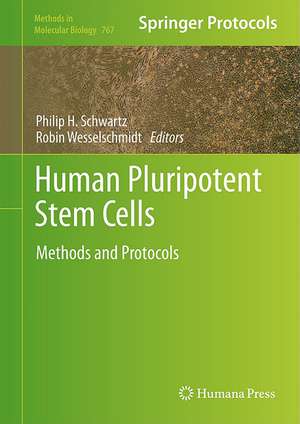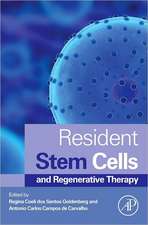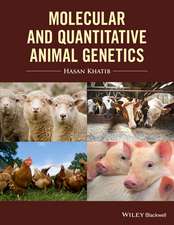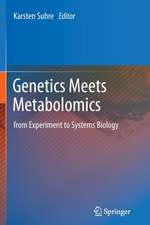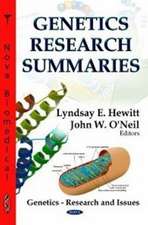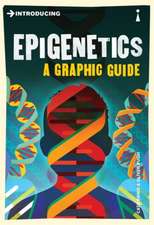Human Pluripotent Stem Cells: Methods and Protocols: Methods in Molecular Biology, cartea 767
Editat de Philip H. Schwartz, Robin L. Wesselschmidten Limba Engleză Hardback – 9 aug 2011
Authoritative and accessible, Human Pluripotent Stem Cells: Methods and Protocols serves as an ideal guide to scientists conducting their own pluripotent cell research programs and makes great strides towards furthering human knowledge and, ultimately, improving the human condition.
| Toate formatele și edițiile | Preț | Express |
|---|---|---|
| Paperback (1) | 712.05 lei 43-57 zile | |
| Humana Press Inc. – 23 aug 2016 | 712.05 lei 43-57 zile | |
| Hardback (1) | 964.71 lei 43-57 zile | |
| Humana Press Inc. – 9 aug 2011 | 964.71 lei 43-57 zile |
Din seria Methods in Molecular Biology
- 9%
 Preț: 791.59 lei
Preț: 791.59 lei - 23%
 Preț: 598.56 lei
Preț: 598.56 lei - 20%
 Preț: 882.95 lei
Preț: 882.95 lei -
 Preț: 252.04 lei
Preț: 252.04 lei - 5%
 Preț: 802.69 lei
Preț: 802.69 lei - 5%
 Preț: 729.61 lei
Preț: 729.61 lei - 5%
 Preț: 731.43 lei
Preț: 731.43 lei - 5%
 Preț: 741.30 lei
Preț: 741.30 lei - 5%
 Preț: 747.16 lei
Preț: 747.16 lei - 15%
 Preț: 663.45 lei
Preț: 663.45 lei - 18%
 Preț: 1025.34 lei
Preț: 1025.34 lei - 5%
 Preț: 734.57 lei
Preț: 734.57 lei - 18%
 Preț: 914.20 lei
Preț: 914.20 lei - 15%
 Preț: 664.61 lei
Preț: 664.61 lei - 15%
 Preț: 654.12 lei
Preț: 654.12 lei - 18%
 Preț: 1414.74 lei
Preț: 1414.74 lei - 5%
 Preț: 742.60 lei
Preț: 742.60 lei - 20%
 Preț: 821.63 lei
Preț: 821.63 lei - 18%
 Preț: 972.30 lei
Preț: 972.30 lei - 15%
 Preț: 660.49 lei
Preț: 660.49 lei - 5%
 Preț: 738.41 lei
Preț: 738.41 lei - 18%
 Preț: 984.92 lei
Preț: 984.92 lei - 5%
 Preț: 733.29 lei
Preț: 733.29 lei -
 Preț: 392.58 lei
Preț: 392.58 lei - 5%
 Preț: 746.26 lei
Preț: 746.26 lei - 18%
 Preț: 962.66 lei
Preț: 962.66 lei - 23%
 Preț: 860.21 lei
Preț: 860.21 lei - 15%
 Preț: 652.64 lei
Preț: 652.64 lei - 5%
 Preț: 1055.50 lei
Preț: 1055.50 lei - 23%
 Preț: 883.85 lei
Preț: 883.85 lei - 19%
 Preț: 491.88 lei
Preț: 491.88 lei - 5%
 Preț: 1038.84 lei
Preț: 1038.84 lei - 5%
 Preț: 524.15 lei
Preț: 524.15 lei - 18%
 Preț: 2122.34 lei
Preț: 2122.34 lei - 5%
 Preț: 1299.23 lei
Preț: 1299.23 lei - 5%
 Preț: 1339.10 lei
Preț: 1339.10 lei - 18%
 Preț: 1390.26 lei
Preț: 1390.26 lei - 18%
 Preț: 1395.63 lei
Preț: 1395.63 lei - 18%
 Preț: 1129.65 lei
Preț: 1129.65 lei - 18%
 Preț: 1408.26 lei
Preț: 1408.26 lei - 18%
 Preț: 1124.92 lei
Preț: 1124.92 lei - 18%
 Preț: 966.27 lei
Preț: 966.27 lei - 5%
 Preț: 1299.99 lei
Preț: 1299.99 lei - 5%
 Preț: 1108.51 lei
Preț: 1108.51 lei - 5%
 Preț: 983.72 lei
Preț: 983.72 lei - 5%
 Preț: 728.16 lei
Preț: 728.16 lei - 18%
 Preț: 1118.62 lei
Preț: 1118.62 lei - 18%
 Preț: 955.25 lei
Preț: 955.25 lei - 5%
 Preț: 1035.60 lei
Preț: 1035.60 lei - 18%
 Preț: 1400.35 lei
Preț: 1400.35 lei
Preț: 964.71 lei
Preț vechi: 1176.47 lei
-18% Nou
Puncte Express: 1447
Preț estimativ în valută:
184.61€ • 191.65$ • 153.94£
184.61€ • 191.65$ • 153.94£
Carte tipărită la comandă
Livrare economică 24 martie-07 aprilie
Preluare comenzi: 021 569.72.76
Specificații
ISBN-13: 9781617792007
ISBN-10: 1617792004
Pagini: 488
Ilustrații: XX, 468 p.
Dimensiuni: 178 x 254 x 30 mm
Greutate: 1 kg
Ediția:2011
Editura: Humana Press Inc.
Colecția Humana
Seria Methods in Molecular Biology
Locul publicării:Totowa, NJ, United States
ISBN-10: 1617792004
Pagini: 488
Ilustrații: XX, 468 p.
Dimensiuni: 178 x 254 x 30 mm
Greutate: 1 kg
Ediția:2011
Editura: Humana Press Inc.
Colecția Humana
Seria Methods in Molecular Biology
Locul publicării:Totowa, NJ, United States
Public țintă
Professional/practitionerCuprins
The Stem Cell Laboratory: Design, Equipment, and Oversight.- Stem Cell Banks: Preserving Cell Lines, Maintaining Genetic Integrity, and Advancing Research.- Embryonic Stem Cell Derivation from Human Embryos.- Derivation of Human Parthenogenetic Stem Cell Lines.- Generation of Induced Pluripotent Stem Cell Lines from Human Fibroblasts via Retroviral Gene Transfer.- Derivation of Induced Pluripotent Stem Cells by Lentiviral Transduction.- Transgene-free Production of Pluripotent Stem Cells using PiggyBac Transposons.- Traditional Human Embryonic Stem Cell Culture.- Xeno-Free Culture of Human Pluripotent Stem Cells.- Adaptation of Human Pluripotent Stem Cells to Feeder-Free Conditions in Chemically-Defined Medium with Enzymatic Single-Cell Passaging.- GMP Scale-Up and Banking of Pluripotent Stem Cells for Cellular Therapy Applications.- Culture of Human Pluripotent Stem Cells on Glass Slides for High-Resolution Imaging.- Classical Cytogenetics: Karyotyping Techniques.- FISH Analysis of Human Pluripotent Stem Cells.- Immunocytochemical Analysis of Human Pluripotent Stem Cells.- Flow Cytometric Analysis of Human Pluripotent Stem Cells.- The Teratoma Assay: An In vivo Assessment of Pluripotency.- Detection of Copy Number Variation using SNP Genotyping.- Genome-wide Epigenetic Analysis of Human Pluripotent Stem Cells by ChIP and ChIP-Seq.- Basic Approaches to Gene Expression Analysis of Stem Cells by Microarrays.- Development of High Content Screening Approaches and Analysis for Human Pluripotent Stem Cells.- Quantitative Proteome and Phosphoproteome Analysis of Human Pluripotent Stem Cells.- Lentivirus-mediated Modification of Pluripotent Stem Cells.- Nucleofection of Human Embryonic Stem Cells.- Non-viral Gene Delivery in Neural Progenitors Derived from Human Pluripotent Stem Cells.- Gene Targeting in Human Pluripotent Stem Cells.- Episomal Transgene Expression in Pluripotent Stem Cells.- The Generation of Embryoid Bodies from Feeder-based or Feeder-free Human Pluripotent Stem Cell Cultures.- Derivation of Oligodendrocyte Progenitor Cells from Human Embryonic Stem Cells.- Directed Differentiation of Dopamine Neurons From Human Pluripotent Stem Cells.- Methods for the Derivation and Use of Cardiomyocytes from Human Pluripotent Stem Cells.- In Vivo Evaluation of Putative Hematopoietic Stem Cells Derived from Human Pluripotent Stem Cells.- Differentiation of Dendritic Cells from Human Embryonic Stem Cells.
Recenzii
From the reviews:
“The volume is a compilation of 33 detailed protocols divided into six parts … . All the protocols are superbly illustrated with many figures and charts presented in full colours. I think this book is a must for all those are working with human pluripotent stem cells, no matter if students entering the field or colleagues already involved, each of them will get the chance to sharpen their conceptual insights.” (Carlo Alberto Redi, European Journal of Histochemistry, Vol. 56, 2012)
“The volume is a compilation of 33 detailed protocols divided into six parts … . All the protocols are superbly illustrated with many figures and charts presented in full colours. I think this book is a must for all those are working with human pluripotent stem cells, no matter if students entering the field or colleagues already involved, each of them will get the chance to sharpen their conceptual insights.” (Carlo Alberto Redi, European Journal of Histochemistry, Vol. 56, 2012)
Textul de pe ultima copertă
Almost daily, new technologies are being presented that move the field of human pluripotent stem cell research towards a future that may yield highly-effective, personalized medical treatments. Three enabling technologies at hand for human PSCs are 1) directed reprogramming of somatic cells, which eliminate many of the ethical issues associated with the derivation and use of human PSCs, increase genetic diversity of the available human PSC lines, and give rise to better in vitro human disease models; 2) the discovery that a Rho-associated protein Kinase (ROCK) inhibitor allows for efficient single cell passaging and cryopreservation, increasing the efficiency and reliability of hPSC culture; and 3) defined, animal-component-free media, which lay the groundwork for simplified scale-up for therapeutic applications, differentiation protocols, and toxicology screens. The aforementioned technologies can be found in Human Pluripotent Stem Cells: Methods and Protocols, a compilation of 33 detailed protocols in six categories of PSC research that cover laboratory essentials and the derivation of new PSC lines, including induced PSC lines, as well as their growth, maintenance, characterization, genetic manipulation, and differentiation. Written in the successful Methods in Molecular Biology™ series format, chapters include introductions to their respective topics, lists of the necessary materials and reagents, step-by-step, readily reproducible protocols, and notes on troubleshooting and avoiding known pitfalls.
Authoritative and accessible, Human Pluripotent Stem Cells: Methods and Protocols serves as an ideal guide to scientists conducting their own pluripotent cell research programs and makes great strides towards furthering human knowledge and, ultimately, improving thehuman condition.
Authoritative and accessible, Human Pluripotent Stem Cells: Methods and Protocols serves as an ideal guide to scientists conducting their own pluripotent cell research programs and makes great strides towards furthering human knowledge and, ultimately, improving thehuman condition.
Caracteristici
Includes cutting-edge methods and protocols Provides step-by-step detail essential for reproducible results Contains key notes and implementation advice from the experts Includes supplementary material: sn.pub/extras
